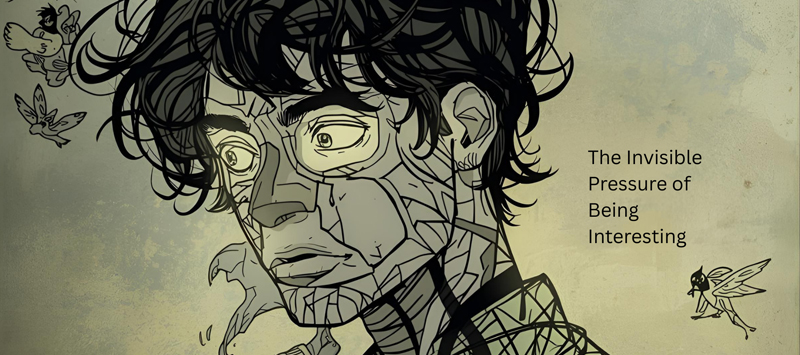
The Invisible Pressure of Being Interesting
 |
Ameya Vinod 24JPEA05 BA JOPYEN A, Department of English Kristu Jayanti (Deemed to be University) |
We live in a time where being known is prioritised over what one truly knows, being seen over what is truly shown. The "main character" life could often be ruled out as a myth; a lie forged to be accepted by something that's built on further lies. Societal expectations take a dramatic turn when young adults set out not to please the standard norms, but to cater to each other's interests.
Interests, hobbies, ideas, fun and beliefs are purely subjective. But when one imposes their idiosyncratic thoughts onto others as the "ideal" or what we would now term as "cool," is when the real deal begins. Earlier, these basic trends were limited to ethics and manners, such as the need to be kind, empathetic, giving, and more. Today, if one is cool, they're indubitably equivalent to being friendly, kind and fun. The concept of uniqueness has become weirdly befuddling and enigmatic. One must be unique, but not too unique from the standard trending interests. One can share the same interest with a hundred others, but as long as it makes the "cool" and "interesting" list of events, it is seen just as unique and fresh as it was when it first caught the public's attention. You must either be a black sheep who isn't too black, or be among the white but not too white. But being achromatic is not cool. And what's much saddening is to watch the youth, who are ideally supposed to be full of energy, joy and exuberance, fall under the blinding addiction of being heartless. Children involving themselves with alcohol, cigarettes, and other harmful activities under the pressure of "fitting in" and "experiencing reality". Many pretend to be unbothered and jaded under the cursing title of "nonchalance". People refrain from expressing themselves and shame those who do, because somehow the new cool is to be cold and silent. What's even funnier is that the overuse of the term 'nonchalance' has, conversely, led to the annihilation of its true meaning. Being interesting thus holds the ascendancy to manoeuvre one's choices and emotions.
Another aspect of being interesting is to disregard the ordinary. One wants to change the world with their thoughts, while the other wants to change it with their talent. One wants to try something new, while the other wants to create it from scratch. Why is it an offence to those trying to stand out when the other is happy with the ordinary? Choosing the ordinary is often ruled out as tedious and lazy, regardless of the calm and happiness it could bring. Appreciating someone for achieving something by doing something never done before is appropriate, but to subject that victory as a weapon of excoriation against someone who achieved the same by regular means, claiming unworthy of the prize and of exultation. Being interesting has often become synonymous with celebrating negative ideas and habits. People need to realise that being ordinary, following traditional ideas, and being human aren't things to be ashamed of or to be excluded from daily life. If anything, these have got so common that being uncool must be the new cool.